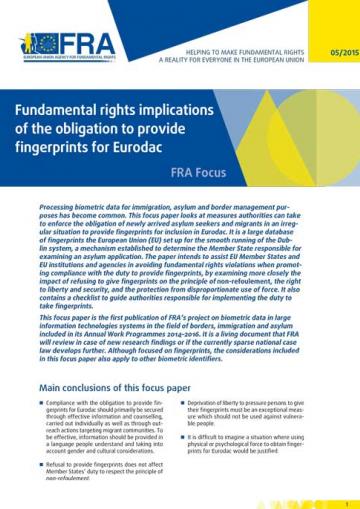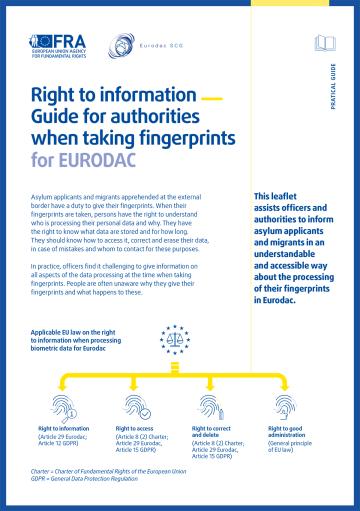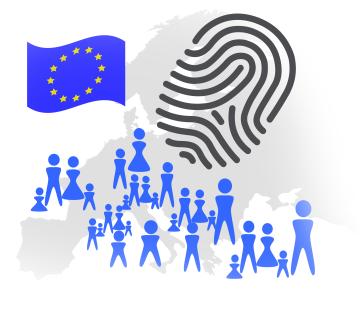
Fundamental rights implications of the obligation to provide fingerprints for Eurodac
- Main conclusions
- Checklist to act in compliance with fundamental rights when obtaining fingerprints for Eurodac
Eurodac is a large database of fingerprints the European Union (EU) set up for the smooth running of the Dublin system, a mechanism established to determine the Member State responsible for examining an asylum application. The paper intends to assist EU Member States and EU institutions and agencies in avoiding fundamental rights violations when promoting compliance with the duty to provide fingerprints, by examining more closely the impact of refusing to give fingerprints on the principle of non-refoulement, the right to liberty and security, and the protection from disproportionate use of force. It also contains a checklist to guide authorities responsible for implementing the duty to take fingerprints.
This focus paper is the first publication of FRA’s project on biometric data in large information technologies systems in the field of borders, immigration and asylum included in its Annual Work Programmes 2014–2016. It is a living document that FRA will review in case of new research findings or if the currently sparse national case law develops further. Although focused on fingerprints, the considerations included in this focus paper also apply to other biometric identifiers.
Main conclusions of this focus paper:
- Compliance with the obligation to provide fingerprints for Eurodac should primarily be secured through effective information and counselling, carried out individually as well as through outreach actions targeting migrant communities. To be effective, information should be provided in a language people understand and taking into account gender and cultural considerations.
- Refusal to provide fingerprints does not affect Member States’ duty to respect the principle of non-refoulement.
- Deprivation of liberty to pressure persons to give their fingerprints must be an exceptional measure which should not be used against vulnerable people.
- It is difficult to imagine a situation where using physical or psychological force to obtain fingerprints for Eurodac would be justified.
Checklist to act in compliance with fundamental rights when obtaining fingerprints for Eurodac
Asylum seekers and migrants in an irregular situation apprehended in connection with their unauthorised border crossing have a duty to provide fingerprints for Eurodac. Member States are obliged to take their fingerprints, but there are limitations on how to enforce such obligation so as not to violate fundamental rights. FRA compiled this checklist to assist authorities and officers who have been assigned the task of taking fingerprints for Eurodac to act in compliance with fundamental rights, parts of which are also useful for individual officers.
☑ Obtaining fingerprints should be part of the registration and referral/relocation process, and not implemented as a stand-alone activity.
☑ At the start of the fingerprinting process, officers must inform each person on the obligation to give fingerprints, the purpose for collecting the fingerprints and the manner in which fingerprints will be processed, as required by Article 29 of the Eurodac Regulation. Information should be provided both orally – in simple terms – as well as in writing, in a language the person understands.
☑ Initial information on fingerprinting for Eurodac should be given together with other registration- related information. To be effective, information should be provided through appropriate means, in a language the persons understand, and taking into account gender, age and cultural considerations. Information should target the individual but, where appropriate, also be complemented by community-level initiatives.
☑ Officers should have basic skills in noticing signs that a person may be traumatised, a victim of torture, trafficking in human beings, sexual or gender-based violence, or other serious crime; and be trained on how to mitigate the risk of re-traumatisation or other complications during the fingerprinting.
☑ Officers should have the necessary skills to recognise whether a fingertip texture was altered in bad faith, or whether it is physically impossible to take good quality fingerprints, and refrain from imposing any hardship on people who cannot provide their fingerprints for justifiable reasons (such as torn fingerprints as a result of manual work).
☑ When someone refuses to give fingerprints, officers should inquire what the reasons for the refusal are (refusals may not only be motivated by the wish to circumvent the Dublin rules, but also by other considerations, such as the fear of data being shared with the country of origin), and record these.
☑ Before resorting to coercive measures, people need to be provided with an effective opportunity to comply voluntarily with the fingerprinting requirements, including by asking them to appear for fingerprinting a second time. People who have been informed and continue to object to giving their fingerprints should be counselled with a view to addressing their fears and expectations.
☑ Detaining someone to force them to give their fingerprints must remain an exceptional measure. It can only be considered if provided for under national law; must be aimed only at fulfillment of the duty to provide fingerprints; must not be punitive; must be of limited duration; and must cease the moment the obligation is fulfilled. Facilities used must be adequate and conditions therein humane.
☑ The use of physical or psychological force to obtain fingerprints for Eurodac should be avoided, given that this entails a high risk of violating fundamental rights.
☑ Children, suspected victims of torture, sexual or gender-based violence, victims of other serious crimes, as well as traumatised people should not be detained or coerced into giving fingerprints, nor should other people usually considered vulnerable. No fingerprints for Eurodac should be obtained from children if there is doubt concerning whether or not they have reached 14 years of age.



